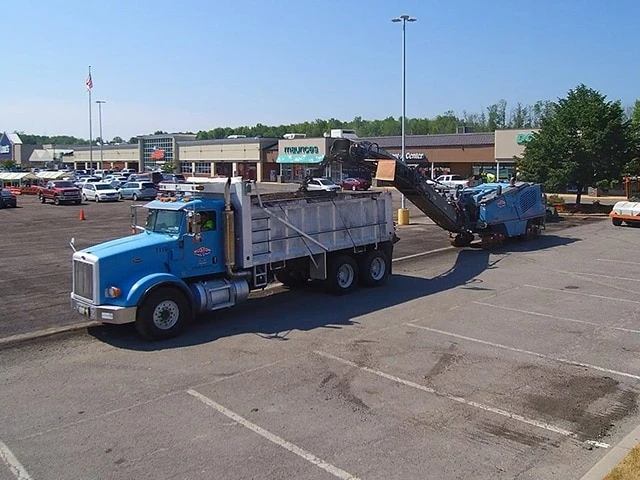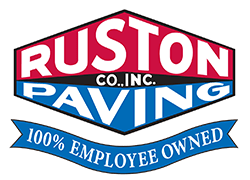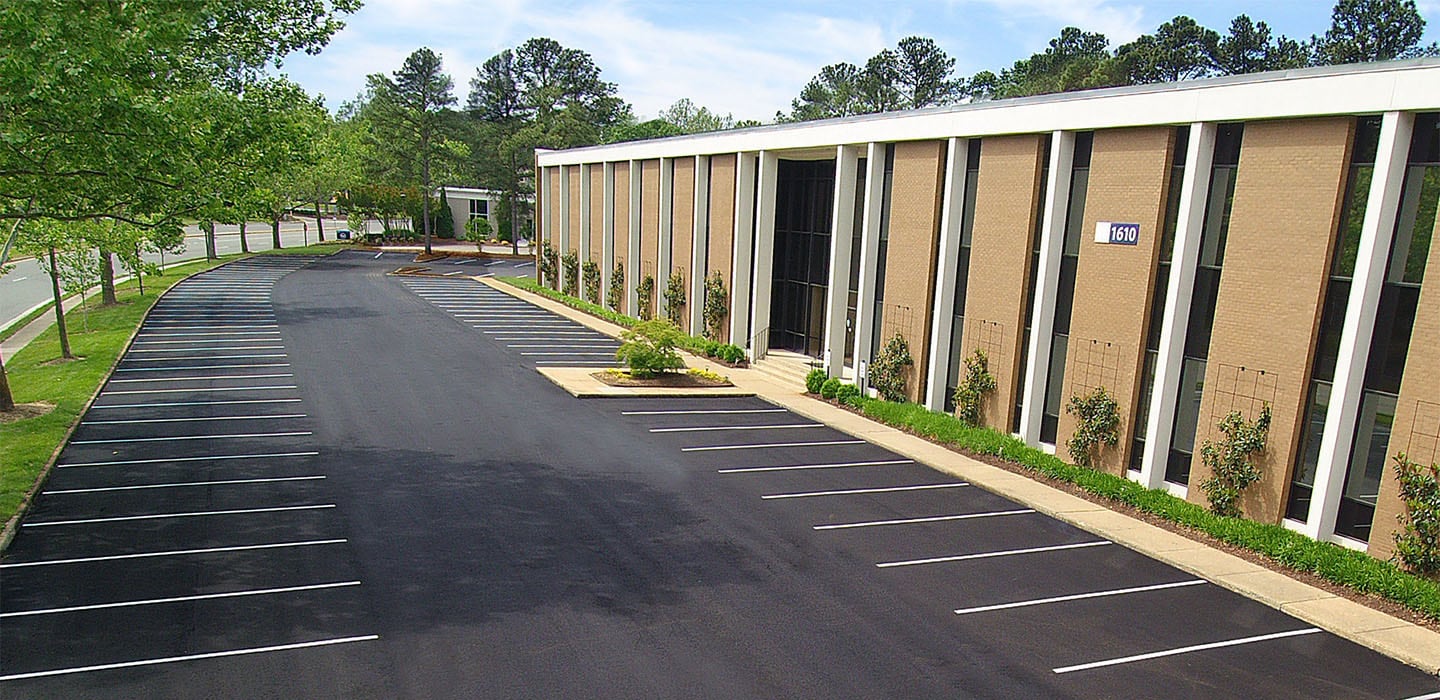
When it comes to maintaining smooth, long-lasting roadways, parking lots, and driveways, asphalt is a go-to material for its strength and affordability. So, how are aging asphalt surfaces restored to prepare for a fresh layer of asphalt? The answer lies in a key process called asphalt milling.
In this detailed guide, our asphalt paving experts from Ruston Paving explain the importance of asphalt recycling, the techniques involved in asphalt milling, and how this process revitalizes worn-out surfaces, enhancing the durability of paved infrastructure.
Whether you're a property manager, business owner, or simply curious about the mechanics of asphalt paving, this guide will show how asphalt milling plays a vital role in extending the life of paved surfaces.
Table of Contents
Understanding Asphalt Milling vs Asphalt Recycling
Asphalt milling is the process of removing the top layer of an existing asphalt surface to allow for resurfacing without the need for a complete replacement. Specialized machinery, called milling machines, grind down the surface to a specific depth, ensuring that the base layer remains intact. This allows for a smooth, even surface on which a new layer of asphalt can be applied.
Asphalt milling is often used for roadways, parking lots, and other paved surfaces that need repair but don’t require full excavation. The milled material, known as RAP (Reclaimed Asphalt Pavement), can be collected and reused in future paving projects.

Asphalt Recycling
Asphalt recycling refers to the process of reusing RAP to create new asphalt mixtures. Rather than disposing of old asphalt, the recycled material is incorporated into fresh asphalt during the production process, reducing the need for new materials. This environmentally friendly approach saves resources, lowers costs, and helps to reduce waste. Asphalt recycling can be done both in-plant, where the RAP is transported to a production facility, or on-site using specialized equipment that allows the recycling process to happen directly at the job site.
While asphalt milling focuses on the removal of the surface for new layers, asphalt recycling emphasizes repurposing the milled material, making these processes complementary in sustainable paving practices.
Purpose and Benefits of Asphalt Milling
The purpose of asphalt milling, also known as cold milling or profiling, is multifaceted and plays a crucial role in the maintenance and construction of asphalt surfaces. Let’s take a closer look at the primary purposes of asphalt milling.

Asphalt Pavement Milling Machines
An asphalt milling machine, also known as a cold planer or pavement milling machine, is a specialized piece of heavy equipment used in the asphalt milling process. Its primary function is to remove the top layer of an existing asphalt surface to prepare it for resurfacing or rehabilitation.
Surface Removal
The primary task of an asphalt milling machine is to remove the top layer of asphalt from a pavement surface. This involves rotating cutting drums equipped with sharp teeth or milling bits that grind and cut into the asphalt. The machine’s adjustable depth control allows operators to select the desired depth of milling, which can range from a fraction of an inch to several inches, depending on the project requirements.
Material Collection
As the milling machine grinds the surface asphalt layer, it simultaneously collects the milled material, which is typically a mix of crushed aggregate and asphalt. This material is conveyed into a holding chamber or conveyor system within the machine.
Surface Profiling
Asphalt milling machines are capable of creating a smooth and even profile on the milled surface. By removing imperfections, such as potholes, cracks, and irregularities, they ensure that the new asphalt layer adheres securely to the milled base. Profiling also helps with water drainage and surface texture improvements.
Recycling
The collected milled material can be recycled and reused in future asphalt projects, reducing the need for fresh asphalt and minimizing waste. Recycling milled asphalt is an environmentally sustainable practice that conserves resources and reduces the carbon footprint associated with asphalt production.
Precision Control
Modern asphalt milling machines are equipped with advanced technologies and computerized controls that allow operators to maintain precise cutting depths, control the machine’s speed, and ensure consistent milling results. This precision is crucial for achieving the desired surface quality.
Versatility
Asphalt milling machines come in various sizes and configurations, making them suitable for a wide range of projects. They can tackle everything from small driveway repairs to large-scale highway milling, adapting to different asphalt thicknesses and surface conditions.
Safety Features
Safety is a paramount concern when operating heavy machinery. Asphalt milling machines are designed with safety features such as operator stations with excellent visibility, backup cameras, and emergency shut-off systems to protect both operators and workers in the vicinity. Equally important to safety features on equipment, providing safety training for all members of the team can save lives.
Types of Asphalt Milling Equipment
There are several different types of asphalt milling machines, each designed for specific purposes and project requirements. These machines vary in size, capabilities, and features.
Cold Planers
Standard cold planers are the most common type of asphalt milling machines. They come in various sizes and configurations, suitable for a wide range of projects, from minor road repairs to larger highway milling jobs. These machines offer versatility and efficiency.
Small Cold Planers
Also known as mini or compact cold planers, these machines are relatively small and are often used for precision work on smaller projects, such as driveway repairs or patching. They are highly maneuverable and can access tight spaces.
Large Cold Planers
Large cold planers are heavy-duty machines designed for high-production milling tasks, such as major highway rehabilitation or airport runway resurfacing. They have a wide working width and can remove thick asphalt layers in a single pass.
Track Cold Planers
Track cold planers are equipped with tracks instead of wheels, which provide better stability and weight distribution. They are ideal for working on uneven terrain or when precise control is needed.
Drum-style Milling Machines
These machines have rotating drums equipped with cutting teeth or milling bits that grind and remove the asphalt. Drum-style machines are the most common and are available in various sizes and configurations.
Wheel-type Milling Machines
These machines have wheels instead of tracks and are suitable for projects where mobility and speed are essential. They are often used for road resurfacing and repair work.
Integrated Mill-and-Fill Machines
Some milling machines are designed to perform both milling and paving in one continuous operation. These integrated machines streamline the process by milling the old surface and immediately placing a new layer of asphalt.
Road Profilers
Road profilers are specialized milling machines used to create precise road profiles for road construction projects. They ensure that the road surface meets specific elevation and smoothness requirements.
Half-lane and Full-lane Milling Machines
These large milling machines are capable of removing significant sections of asphalt in a single pass. They are commonly used for highway construction and major road rehabilitation.
The Asphalt Milling Process
The asphalt milling process is a highly controlled method used to remove the top layer of an asphalt surface. This process ensures that the underlying layers remain intact, allowing for efficient resurfacing. Let’s look at what happens during each step involved in the asphalt milling process.

Surface Types Suitable for Asphalt Milling
Asphalt milling is a versatile process that can be applied to a wide range of surface types. Below are some of the most common surface types where asphalt milling is used.
Roadways
Asphalt milling is widely used on public roads and highways to restore smoothness and durability without needing a full-depth replacement. The process is ideal for addressing issues like surface cracking, rutting, or uneven wear caused by heavy traffic. Milling removes the damaged layer and provides a fresh, even surface ready for new asphalt, improving both safety and longevity.
Parking Lots
Milling is a common solution for commercial parking lots that experience wear and tear from frequent vehicle traffic. Over time, parking lot surfaces can develop cracks, potholes, and other issues that affect functionality and appearance. Asphalt milling allows property owners to restore the lot’s surface efficiently, ensuring a smoother, safer environment for vehicles and pedestrians.
Driveways
Residential and commercial driveways benefit from asphalt milling when they require resurfacing due to weather-related damage or general wear over time. This method removes the top layer without disturbing the foundation, which helps prolong the life of the driveway while maintaining its aesthetic appeal.
Airport Runways and Taxiways
Asphalt milling is crucial for the maintenance of airport runways and taxiways. These surfaces require precision and smoothness for safe aircraft operation. Milling allows for quick and efficient resurfacing, ensuring that any surface irregularities are removed, and the new layer of asphalt adheres properly, reducing downtime for airports.
Industrial and Loading Zones
In areas like industrial parks and loading zones, heavy trucks and machinery can cause significant surface damage over time. Asphalt milling provides an effective way to remove damaged layers, especially in high-traffic zones. The process ensures that the area is ready for resurfacing, improving its ability to handle the stress from heavy equipment and vehicles.
Sports Courts and Recreational Areas
Asphalt surfaces like tennis courts, playgrounds, and university tracks also benefit from milling. Over time, these surfaces may crack or wear out, impacting performance and safety. Milling the surface allows for a smooth, even layer to be laid down, ensuring the longevity and quality of these recreational areas.
Understanding Asphalt Milling vs Asphalt Recycling
Asphalt milling is the process of removing the top layer of an existing asphalt surface to allow for resurfacing without the need for a complete replacement. Specialized machinery, called milling machines, grind down the surface to a specific depth, ensuring that the base layer remains intact. This allows for a smooth, even surface on which a new layer of asphalt can be applied.
Asphalt milling is often used for roadways, parking lots, and other paved surfaces that need repair but don’t require full excavation. The milled material, known as RAP (Reclaimed Asphalt Pavement), can be collected and reused in future paving projects.
Partner with Our Trusted Paving Experts in NY, NC, and VA
When it comes to asphalt milling and paving projects, choosing the right partner can make all the difference. At Ruston Paving, we bring 80 years of experience, advanced techniques, and a commitment to excellence that ensures long-lasting, high-quality results for every project. Here’s why partnering with our trusted paving experts is the best choice for your asphalt needs.
Proven Expertise and Experience
With a strong track record of success, our team has handled a wide range of projects, from roadways and parking lots to specialized surfaces like airport runways and sports courts. Our experience means we understand the complexities of different surfaces and can tailor our approach to meet the unique demands of your project, ensuring precision and quality in every detail.
State-of-the-Art Equipment
We use the latest technology and top-of-the-line milling and paving equipment to deliver efficient, accurate results. Our advanced machinery allows us to remove and replace asphalt surfaces with minimal disruption, ensuring that your project stays on time and within budget. By investing in the best tools for the job, we guarantee a smoother, more durable finish.
Commitment to Sustainability
At Ruston Paving, we prioritize eco-friendly practices, including the recycling of milled asphalt into new paving materials. This not only reduces waste but also lowers costs and conserves natural resources. When you partner with us, you’re choosing a company that is as committed to environmental responsibility as we are to delivering exceptional results.
Customized Solutions for Every Project
No two paving projects are the same, which is why we offer customized solutions that address the specific needs of your surface. Whether you require milling, full-depth reclamation, or new asphalt installation, we take the time to assess your project and recommend the most effective approach. Our tailored services ensure that your pavement not only looks great but stands the test of time.
Focus on Long-Term Durability
Our experts don’t just focus on a quick fix—we aim for long-term results. By using high-quality materials and precise techniques, we ensure that your asphalt surfaces are built to last. Whether you’re resurfacing a parking lot or a major roadway, you can trust us to deliver solutions that enhance the durability and longevity of your pavement.
Superior Customer Service
We believe that communication and customer satisfaction are key to successful projects. From your initial consultation to the final inspection, our team works closely with you to ensure every aspect of the project meets your expectations. Our commitment to providing responsive, transparent service makes the entire process seamless and stress-free.
Contact Our Experts in Asphalt Paving Today
If you're considering an asphalt paving project or have any questions about the process, don't hesitate to reach out to our top-rated team of paving experts. Our experienced professionals at Ruston Paving are ready to assist you every step of the way, from planning and material selection to the final installation of your asphalt surface.
Call us at to speak to an asphalt paving professional today. You can also reach out to us via our online contact form.
We proudly serve customers in and around Syracuse, NY, Rochester, NY, Watertown, NY, Northern Virginia, Richmond, VA, Raleigh-Durham, NC, and Greensboro-Winston-Salem, NC.

